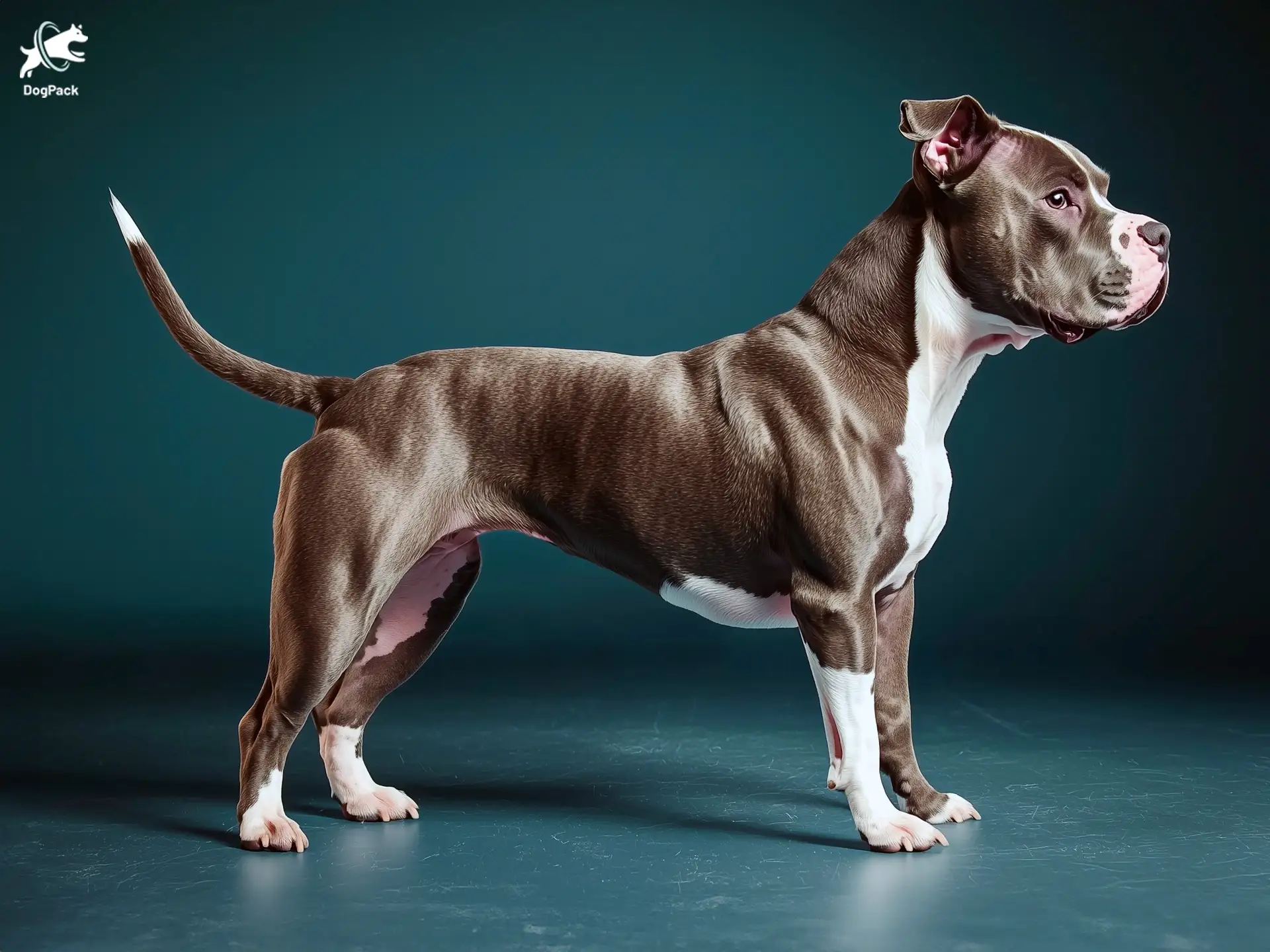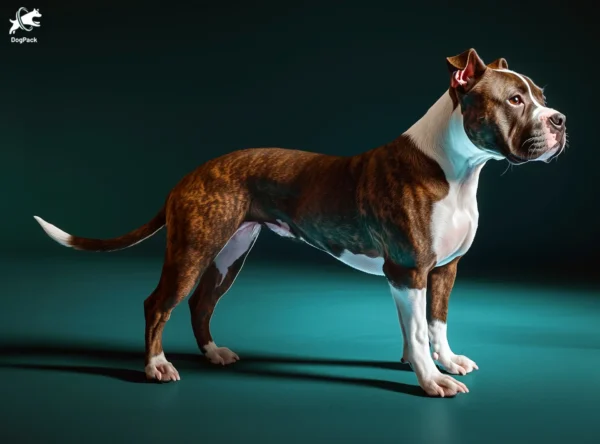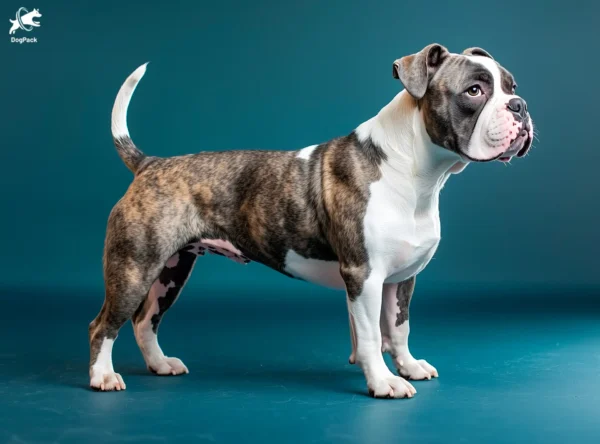American Pit Bull Terrier Dog Breed Info & Overview
The American Pit Bull Terrier is a powerful, misunderstood breed with a rich history rooted in work and companionship. Known for their muscular build and unwavering loyalty, they are much more than their tough exterior. These dogs are energetic, intelligent, and thrive on human interaction. When raised in a loving environment, they form deep bonds with their families, making them devoted, playful companions for those who appreciate their strong spirit.
Characteristics
Pictures
Breed History
Did you know that the American Pit Bull Terrier’s roots trace back to early 19th-century England? Originally bred from Old English Bulldogs and Terriers, they were developed for bull-baiting and later dog fighting, which were common pastimes of that era.
When these dogs made their way to America, they became invaluable on farms and ranches. They were used for hunting wild game, guarding property, and providing companionship. The American Pit Bull Terrier evolved into a larger dog than its English relatives, reflecting the needs of American settlers.
Despite their historical use in fighting, today’s American Pit Bull Terriers are often loving family members. Responsible breeding and training have shifted their roles from fighting to being affectionate companions and even therapy dogs. Their history is rich and complex, adding to the depth of this incredible breed.
Temperament, Personality
Forget the stereotypes—American Pit Bull Terriers are some of the most affectionate dogs you’ll meet. They are known for their unwavering loyalty and a strong desire to please their owners. This makes them incredibly loving pets when properly socialized.
Around children, they can be gentle and tolerant, often forming strong bonds with the younger members of the family. However, due to their strength and energy, supervision is recommended to ensure playtime stays safe and fun for everyone involved.
When it comes to other pets, early socialization is key. The American Pit Bull Terrier may show aggression towards other dogs if not properly introduced. With consistent training and positive reinforcement, they can learn to get along with other animals in the household.
Physical Characteristics
Sporting a muscular and athletic build, the American Pit Bull Terrier is a picture of strength and agility. They have a short, smooth coat that comes in a variety of colors, including brindle, black, white, and tan. Their eyes are round to almond-shaped, often exuding an intelligent and eager expression.
Their head is proportionate to their body, featuring a broad skull and a strong jaw. Ears can be either cropped or natural, and the tail is thick at the base, tapering to a point. Despite their stocky appearance, they are incredibly agile and quick on their feet.
Standing between 17 to 21 inches tall and weighing between 30 to 60 pounds, the American Pit Bull Terrier is a medium-sized dog with a big presence. Their physical traits not only contribute to their powerful appearance but also to their capabilities in various activities and work.
Health Issues
Like all breeds, the American Pit Bull Terrier is prone to certain health conditions. Common issues include hip dysplasia, a genetic condition that can lead to arthritis and mobility problems. Regular vet check-ups and maintaining a healthy weight can help mitigate this risk.
Skin allergies are another concern. The breed may develop sensitivities to grass, pollen, or certain foods, leading to itchy skin and discomfort. Monitoring their environment and diet can help manage these allergies effectively.
Heart disease, specifically congenital heart defects, can also occur in this breed. Early detection through regular veterinary examinations is crucial. With proper care and attention, many American Pit Bull Terriers live healthy, active lives well into their senior years.
Grooming Needs
Good news for those who dread endless grooming sessions—the American Pit Bull Terrier’s short coat is low-maintenance. A weekly brush with a soft-bristle brush or a rubber grooming mitt is usually sufficient to keep their coat shiny and healthy.
Bathing is only necessary when they’ve rolled in the mud or start to develop a doggy odor. Over-bathing can strip natural oils from their skin, leading to dryness and irritation. Using a gentle, dog-specific shampoo is recommended.
Don’t forget about dental hygiene and nail care. Regular teeth brushing will help prevent dental issues, and their nails should be trimmed regularly to prevent cracking or splitting. Ear cleaning is also important to prevent infections, especially if your dog enjoys outdoor adventures.
Exercise Requirements
If you’re looking for a couch potato, the American Pit Bull Terrier might not be your ideal match. These dogs are energetic and require at least 1–2 hours of exercise each day. This can include walks, runs, playtime in the yard, or interactive games like fetch and tug-of-war.
Mental stimulation is just as important as physical activity. Puzzle toys, obedience training, and agility courses can keep their intelligent minds engaged. Without sufficient exercise and mental challenges, they may become bored and resort to destructive behaviors.
Remember, a tired American Pit Bull Terrier is a happy one. Regular exercise not only keeps them physically fit but also strengthens the bond between you and your furry friend.
Training Tips
Training an American Pit Bull Terrier requires consistency, patience, and positive reinforcement. They are intelligent and eager to please, which makes them highly trainable. Start socialization and basic obedience training early to instill good manners.
Avoid harsh training methods; instead, use rewards like treats, praise, and playtime to motivate them. This breed responds best to a firm but loving approach. Setting clear boundaries will help them understand what’s expected.
Be aware that they may exhibit stubbornness at times. Keeping training sessions short and fun can help maintain their interest. Enrolling in a professional obedience class can also be beneficial for both you and your dog.
Nutrition, Diet
Feeding your American Pit Bull Terrier a balanced diet is crucial for their health and energy levels. High-quality dog food that lists meat as the first ingredient is recommended. They typically require 1.5 to 2.5 cups of dry food per day, divided into two meals.
Given their propensity for skin allergies, you might need to consider grain-free or hypoallergenic options if sensitivities arise. Always monitor their weight to prevent obesity, which can exacerbate health issues like hip dysplasia.
Consulting with your veterinarian can help tailor a diet plan that meets the specific nutritional needs of your American Pit Bull Terrier, ensuring they thrive at every life stage.
Adoption, Breeders
If you’re considering adding an American Pit Bull Terrier to your family, adoption is a wonderful option. Many rescue organizations specialize in this breed, offering dogs of various ages and backgrounds. Websites like Pit Bull Rescue Central provide resources and listings for adoptable dogs.
If you choose to go through a breeder, make sure they are reputable and adhere to ethical breeding practices. They should provide health clearances for both puppy parents, ensuring the puppies are free from genetic conditions.
Avoid purchasing from puppy mills or unscrupulous breeders. Doing thorough research and asking for references can help you find a responsible source for your new companion.
Family Pet?
With proper training and socialization, the American Pit Bull Terrier can make a loving family pet. They are known for their affectionate nature towards their human family members, including children. Their playful spirit often makes them great playmates.
However, due to their strength and energy, they may not be suitable for households with very young children unless closely supervised. Teaching both the dog and the kids how to interact safely is crucial.
Keep in mind that some communities have breed-specific legislation that may affect ownership. Always check local laws before bringing an American Pit Bull Terrier into your home.
Right For You?
Deciding if an American Pit Bull Terrier is right for you involves considering your lifestyle and experience with dogs. They thrive with active owners who can provide the physical and mental stimulation they need. Experience with strong breeds is a plus.
They may not be the best choice for first-time dog owners due to their strength and training needs. If you’re committed to providing a loving home with consistent training, they can be incredibly rewarding companions.
Remember, owning an American Pit Bull Terrier comes with responsibilities, including being an ambassador for the breed. Your dedication can help change perceptions and showcase the true nature of these loving dogs.
Conclusion
In summary, the American Pit Bull Terrier is a loyal, affectionate, and intelligent breed that requires an active and dedicated owner. Their energetic nature and strong physique mean they need plenty of exercise and consistent training. If you’re willing to invest the time and effort, you’ll find a devoted companion who brings joy and companionship to your life.
FAQs
-
Are American Pit Bull Terriers good guard dogs?
Yes, American Pit Bull Terriers can make good guard dogs due to their loyalty and alertness. They are protective of their family but require proper training to ensure they respond appropriately to different situations.
-
Do American Pit Bull Terriers get along with cats?
American Pit Bull Terriers can get along with cats if they are raised together and properly socialized. Early introductions and supervision are key to fostering a peaceful relationship between them.
-
How much does it cost to own an American Pit Bull Terrier?
The cost of owning an American Pit Bull Terrier includes initial expenses like adoption fees or purchase price, plus ongoing costs for food, veterinary care, grooming, and training. Budgeting for $1,000–$1,500 per year is a reasonable estimate.
-
What activities are best for American Pit Bull Terriers?
American Pit Bull Terriers excel in activities that challenge them physically and mentally, such as agility courses, obedience competitions, and even weight pulling. Engaging them in such activities keeps them happy and healthy.
-
Are American Pit Bull Terriers suitable for apartment living?
While they can adapt to apartment living, American Pit Bull Terriers require ample exercise and mental stimulation. Owners must commit to daily walks and playtime to meet their energy needs in a smaller living space.
Breed Ratings
The American Pit Bull Terrier is intelligent and learns commands quickly, especially when training is consistent and positive.
These dogs are highly playful and enjoy interactive games, making them great companions for active families.
With boundless energy, they need plenty of physical activity to keep them happy and prevent boredom.
They have a short coat that sheds moderately, requiring minimal grooming to manage loose hairs.
They may have a moderate prey drive, so caution is advised around smaller animals unless properly socialized.
Their short coat is easy to maintain, needing only occasional brushing and infrequent baths.
They are trainable and respond well to positive reinforcement methods, but consistency is key.
American Pit Bull Terriers prefer company and may experience separation anxiety if left alone for long periods.
They are not excessive barkers but may vocalize when excited or alerting to something unusual.
Drooling is minimal with this breed, making them relatively tidy compared to some other breeds.
With proper socialization, they can get along with other dogs, but may show aggression without it.
Generally healthy, but prone to certain conditions like hip dysplasia and skin allergies; regular vet care is important.













